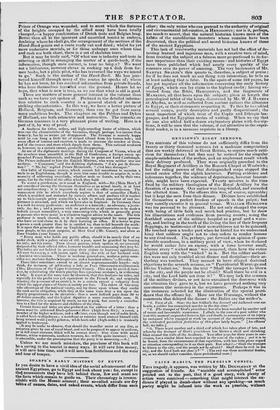HENSLOWE'S EIGHT SERMONS.
THE contents of this volume do not sufficiently differ from the twenty or thirty thousand sermons (at a moderate computation) that are weekly delivered in Great Britain, to require much criti- cism for themselves ; but they may be noticed for tile singular simple-mindedness of the author, and an unpleasant result which their delivery produced. They were originally preached to the Royal Regiment of Artillery in the Barrack Chapel at Woolwich; but the ruling powers of that distinguished corps stopped the sacred orator after the eighth hortative. Putting evidence and inferences together, the sentence of deprivation, however lament- able, might have been expected. Twenty minutes is the time fixed by the military theologians of the Royal Artillery for the duration of a sermon. Our author was long-winded, and exceeded the allotted time. To the officers this was, of course, agreeable; but it kept the men from their dinner. Divines have established for themselves a perfect freedom of speech in the pulpit; but they usually exercise it in general terms. WILLIAM HENSLOWE was too personal to be pleasant. He not only charged the corps with being of little faith and much bad practice, but he drew his illustrations and evidences from passing events; using the deathbed scenes of the military hospital as a proof and a warn- ing, and hurling in the teeth of the living the fact of their frequent floggings, as testimonies of their unworthiness not to be gainsaid. He touched upon a tender part when he hinted (so we understand him) that soldiers ought not to obey orders to render honour to any rival creed. Ile, perhaps, put forward an opinion of ques- tionable soundness, in a military point of view, when he declared he would rather face an enemy, with a force however small, whence every " wicked man" was removed, than have the entire English army with the "wicked " in it. But the soldier authori- ties were not only troubled about thinner and discipline—their or- thodoxy was touched. They seemed to have alleged doctrinal objections to the seventh sermon, on " Providential Warnings and Divine Visitations," from the text " Shall the trumpet be blown in the city, and the people not be afraid ? Shall there be evil in a city, and the Lord bath not done it?" We may lack the acumen of the military divines, or not have examined the discourse with the attention they gave to it, but we have perceived nothing very uncommon (for sermons) in the arguments. Perhaps it was in the instances selected for the illustration of the special provi- dence that the offence lay. Here are the Warnings, without the comments that delayed the dinner : the Italics are the author's.
"I. First of all. Since the last Sabbath-day- dawned and darkened over our heads, a soldier ha committed murder in the day. time !"
"2. The train pet of God's providence has also been sounded by another evil of recent and lamentable occurrence. I allude to the case of a poor soldier who is at this moment suspended between life and death, in consequence of an injury he sustained whilst engaged at work on account of the monthly amusements, the celebrated periodical festivities of this place lately begun." [Au officers' ball, we infer.]
"3. There is yet another and a third evil which has taken place of late, and whereby the trumpet of God's providence has blown a shrill and shrieking blast around the walls of the Academy. Year after year, for three years in suc- cession, has a similar blast been repeated in the ears of the cadets ; and it is to be feared, from the circumstance of that repetition, with but little pious regard or attention corresponding to it on their part. But what Shall the trumpet be blown in the city, and the people not be afraid? Shall there be evil in the city, and the Loid bath not done it?'" [The evil was three accidental deaths, or, as we should rather consider, three providential ones.]


























 Previous page
Previous page